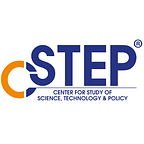Introducing the CSTEP Air Quality Sector
by Subramanian R.
Air quality can be improved through well-designed air quality management plans that are effectively implemented. For this, we need to know the sources impacting a certain location; the emissions contributed by each source; the interventions that can reduce these emissions; the cost of those interventions; and once implemented, their effectiveness. The sources in question can be local (e.g., city traffic emissions), transboundary (e.g., an industry outside a city or sources in another state), or natural (e.g., desert dust or wildfires). To develop air quality management plans and track their progress, we use emissions inventories, techno-economic assessments, air quality modelling, source apportionment, and air quality monitoring.
The Centre for Air Pollution Studies (CAPS) was formed at CSTEP in 2018. Since then, we have carried out several important projects. These include:
· Development of high-resolution emissions inventory for about 80 non-attainment/million-plus cities in India, with techno-economic analysis to identify key mitigation measures.
· Evidence generation for city-level and state-wide air quality management through low-cost sensor deployments, mobile monitoring of on-road air pollution, and source apportionment using filter-based particulate matter (PM) chemical speciation.
· Development of city-level and state-level clean air action plans.
Recognising the growing importance of scientific, data-driven air quality management for achieving the goal of clean air for all in India, CAPS was expanded into the new Air Quality sector in July 2023. The sector comprises three groups: Policy Development and Assessment, Atmospheric Composition Modelling, and Atmospheric Composition Observations.
We envision the future of air quality management in India to include:
· Reduced-complexity air quality models (RCMs) specifically designed for policymaking, which are benchmarked against full-fledged, world-class chemical transport models or CTMs (Weather Research and Forecasting model coupled with Chemistry [WRF-Chem] and Comprehensive Air Quality Model with Extensions [CAMx]). We shall develop capacity building programmes for governments and other think tanks so that RCMs can be incorporated into air quality policy formulation in India within the next five years.
· Hybrid air quality monitoring networks of reference-grade Continuous Ambient Air Quality Monitoring Stations (CAAQMS), supplemented with sensor-based devices. Building trust in sensor devices is critical, for which we shall follow the model set by AQ-SPEC and Afri-SET to establish India Sensor Evaluation and Training (Indi-SET) centres over the next two to three years. The first centre is already active in Bengaluru.
· Highly time-resolved PM chemical speciation (e.g., ToF-ACSM) as part of routine monitoring networks over the next decade to enable better source apportionment and assist decision support systems in non-attainment cities.
· Identification of climate/health/resilience win-win-wins by targeting super pollutants like black carbon and methane.
We use air quality modelling (RCMs and CTMs), coupled with techno-economic assessments to help cities develop strategies for urban local emissions and to help states control transboundary air pollution at the airshed or regional level. Dense hybrid networks in a city can identify hyperlocal hot spots for quick action, while improving our ability to track the effectiveness of implemented policies.
High-time-resolution PM chemical speciation will significantly enhance the identification of sources and quantification of their contributions; it can also, in combination with air quality forecasting, guide proactive Graded Response Action Plan (GRAP) measures.
By targeting super pollutants like black carbon and methane, we aim to help cities, states, and industries to simultaneously improve air quality and reduce their climate footprint.
Finally, we partner with governments and other think tanks to improve their knowledge and capabilities so we can all work together towards clean air for all.
To collaborate with us, please do reach out! And yes, we are hiring!
The author leads the Air Quality sector at CSTEP.
